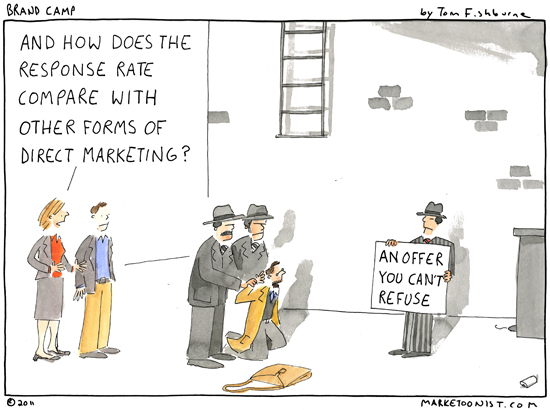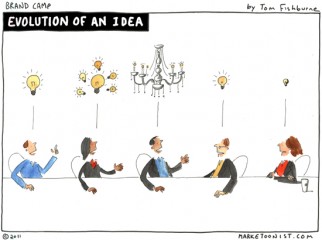Not all direct marketing is spam, but a lot of it is. Whether delivered by email, phone, text, post (or mafia henchman), a lot of direct mail is unwanted and unsolicited. To give a sense of scale, at least 85% of all email now sent is spam.
Yet the response rate is absurdly low. The Direct Marketing Association pegs response rates between 1% (direct mail) and 6% (telemarketing) sent to “prospects” rather than a house list. That means that 94-99% of prospects rejected the direct marketing that reached them.
Some direct marketers compensate for the low response rate by increasing the quantity they try to reach or shouting more about the offer. The economics of direct mail make it easy to blast a large poorly targeted list.
Yet, just because the economics work to blast 100,000 hoping for a scant 1,000 leads doesn’t mean that you should. In chasing quantity, marketers often forget quality. There is power in reaching a smaller audience who truly want to hear from you. I like the mindset framed by Seth Godin in 1999 as “permission marketing“:
“Permission marketing is the privilege (not the right) of delivering anticipated, personal and relevant messages to people who actually want to get them.
It recognizes the new power of the best consumers to ignore marketing. It realizes that treating people with respect is the best way to earn their attention.
Pay attention is a key phrase here, because permission marketers understand that when someone chooses to pay attention they are actually paying you with something precious. And there’s no way they can get their attention back if they change their mind. Attention becomes an important asset, something to be valued, not wasted.
Real permission is different from presumed or legalistic permission. Just because you somehow get my email address doesn’t mean you have permission. Just because I don’t complain doesn’t mean you have permission. Just because it’s in the fine print of your privacy policy doesn’t mean it’s permission either.”
Not only is there no “offer they can’t refuse”, but every offer is an “offer that can be ignored”.



Suzanne Stock says
I absolutely agree with you and that a targeted direct mail campaign generates better results than mailing a mass quantity. We advise all our clients to do this with many selection criteria’s to choose from.
Phil says
Unfortunately, if direct marketing wasn’t an efficient way to reach new (and existing) customers to sell,cross-sell or upsell – you’d assume the marketing community would have ditched it in favour of other media with a better RoAS.
Daniel Rankin says
I recently read the Infusionsoft website that stated, “Email marketing is the #1 way consumers want to be communicated to by businesses” (Microsoft Hotmail). The also said, “the three main reasons people unsubscribe are: 1)not relevant 2)too frequent 3) no value.”
If a business is not targeting email messages to segments of their market with relevant information, then the recipient will not see the relevance or value resulting in non opens and “email fatigue”.
Traditional email marketing is no longer effective and is being taken over by the next evolution of Marketing Automation. Intelligent marketing is based on the ability to collect information about people in your CRM system and send them relevant communication based on their actions and responses to your carefully timed messages….sind the right message to the right person at the right time!
Cheers Daniel
P.S. how about the Don Corleone close…”if you don’t sign this piece of paper I’ll blow your brains out. One way or another there will be something of yours on this paper!.
Martin Bishop says
I think there’s a false assumption that there’s no cost to the 94 to 99% of people who don’t respond to a message.
I know that, several years ago, repeated calls from the LA Times (at dinner time) trying to get me to subscribe to the paper had a cumulative negative effect. This not only made me dislike the paper intensely but also made me an enthusiastic, early adopter of the Do Not Call list.
Most of the time, direct marketers can rely on the fact that the annoyance to the individual of any single communication is low enough that they won’t/can’t do anything about it. But, occasionally, as in the Do Not Call list example, the opportunity comes along for consumers to express their pent-up resentment.
I’m not sure that better targeting, that might reduce the numbers of non-responders by a few percentage points, is the answer.
Daniel A. Rankin says
I too am a fan of DNC. Keep in mind that market segmentation and automated email marketing is permission based. Best practices puts a big emphasis on Anti-Spam. As far as canvessors and spammers are concerned, you are right, they can do themselves a lot of damage.
tomfishburne says
Great comments everyone, thanks. Great Don Corleone closer too, Daniel.
This week’s cartoon print goes to Martin. I wholeheartedly agree with his insight on the false assumption that there’s no cost to the 94%+ who don’t respond to a message. That cost is harder to attribute and measure, but it’s there.
Arun Prabhu says
Thanks Tom for a great piece. In the UK, by law all direct email must have an “unsubscribe me” link, which is religiously use to try and reduce the future volume of junk. From now on, I will also be sending the above piece in a direct response to the sender!
Kristy M. Lopez says
This is a great article and I agree 100%. I receive unsolicited marketing via email and direct mailers all of the time. If I don’t like it, then why would I want to send it to my customers? As a customer of other products and services, I also need to think about what I would want to see and how I would want to be approached…again, here is the Golden Rule at work.